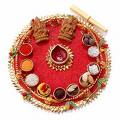How to do the Pooja

Lakshmi is the goddess of light, beauty, good fortune and wealth. It is extremely important to keep the house spotlessly clean and pure on Diwali. Goddess Lakshmi likes cleanliness, and she will visit the cleanest house first. This is also the reason why the broom is worshipped on this day with offerings of haldi and kumkum (turmeric and vermilion). Lamps are lit in the evening to welcome the goddess as they are believed to light up Her path. Lakshmi Pooja consists of a combined Pooja of five deities: Ganesha is worshipped at the beginning of every auspicious act as Vighnaharta; Goddess Lakshmi is worshipped in her three forms - Mahalakshmi (the goddess of wealth and money), Mahasaraswati (the goddess of books and learning), and Mahakali; Kuber (the treasurer of the gods) is also worshipped.
The much celebrated Kali Pooja of West Bengal coincides with the Diwali Festival. Gusto and enthusiasm for Kali Pooja in West Bengal is same as seen for Diwali in rest of India. The only apparent difference one can see is that while rest of India worships Goddess Lakshmi on this day, in West Bengal Goddess Kali is the chief deity for the occasion.

The Diwali Pooja thali is a vital feature of the celebrations associated with Diwali. Not only is Diwali the most propitious of all festivals, but is also the most colorful with all its complex details. There are numerous customs connected with the Diwali festival and among them the illumination with diyas and the ceremonies associated with Lakshmi pooja are the most significant.
Steps of Diwali Lakshmi Pooja
Spread a new cloth on a raised platform: Place a handful of grains in the center and, on this, place a kalash (pitcher) made of gold, silver, copper, or terracotta. Fill three-fourth of the kalash with water and place a betel nut, a flower, a coin, and some rice grains in it. Arrange five kinds of leaves or mango leaves in the kalash. Place a small dish on the kalash and fill it with rice grains. Draw a lotus with turmeric powder (haldi) over the rice grains and place the idol of goddess Lakshmi over it, along with coins.
Place the idol of Ganesha: In front of the kalash, on the right (South-West direction), place the idol of Ganesha. Also place ink and books related to your business or occupation on the platform. Light a lamp and begin the Pooja by offering haldi, kumkum, and flowers to the platform on which the kalash is placed. Then offer haldi, kumkum, and flowers to the water that is to be used for the pooja. Invoke the river goddesses to be part of this water.
Invoke goddess: Lakshmi by reciting the Vedic mantras addressed to her. One can also recite the mantras mentioned in the Puranas or simply take some flowers in your hands, close your eyes, and think of goddess Lakshmi being showered with gold coins by two elephants standing on either side of Her and chant Her name. Then offer the flowers to the idol.

Place the idol of Lakshmi: Place the idol of Lakshmi in a plate and bathe it with water, panchamrit (a mixture of milk, curd, ghee or clarified butter, honey, and sugar) and then with water containing some gold ornament or a pearl. Wipe the idol clean and place it back on the kalash. Alternately, you can just sprinkle water and panchamrit on the idol with a flower.
Offerings: Offer sandal paste, saffron paste, perfume (itr), haldi, kumkum, abeer, and gulal to the goddess. Offer a garland of cotton beads to the goddess. Offer flowers, especially the marigold flowers and leaves of Bel (wood apple tree). Light an incense stick and dhoop. Make an offering of sweets, coconut, fruits, and tambul. Make an offering of puffed rice and batasha. Pour some puffed rice, batasha, coriander seeds, and cumin seeds over the idol. Worship the safe as symbol safe where you keep money and jewelry as a symbol of Lord Kuber.
Diwali pooja aarti: Finally, perform the aarti for goddess Lakshmi. Always remember that She abhors loud noise. So the aarti should be accompanied only by a small bell. Do not clap hands, as is the practice when performing Pooja aarti for other gods. A peaceful and sublime atmosphere should prevail during the diwali Lakshmi poojan. Do not light crackers while the pooja is on or immediately after it.